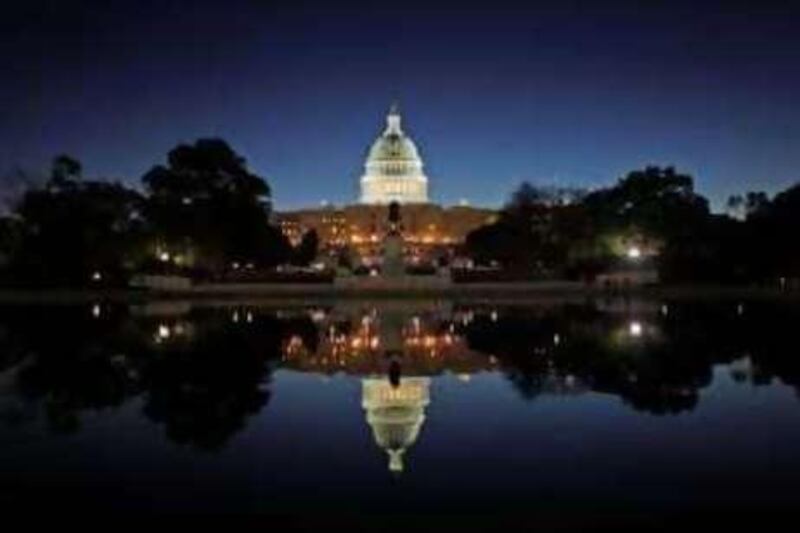Much attention has been paid, and justifiably so, to how the coming presidency of Barack Obama will change the way the world sees the United States, and how we see ourselves. Some have argued that the election of Mr Obama is a final statement about inclusiveness. As one commentator put it, "now when we tell our children they can grow up to be anything they want, we're finally telling the truth".
But the story of diversity and inclusion has been written earlier in the US Senate, where the successes and failures of our inclusiveness can be seen. The final picture of what the 111th Senate will look like is not yet clear. The contests in Georgia and Minnesota have yet to be decided (Georgia requires a runoff election, and Minnesota is so close that a mandatory recount has begun), and the governors of Illinois and Delaware still need to fill the seats that were held by Mr Obama and Joseph Biden, the vice president-elect.
Finally, the picture could change even more should Mr Obama select a senator to serve as secretary of state or any other cabinet post in his administration. But even with this uncertainty, we can begin to sketch out what the 111th Senate will look like, as compared with the 110th Senate. Overall In the 110th Senate there were 51 Democratic votes (49 Democrats and two independents who caucused with them), and 49 Republicans.
The new Senate will have at least 58 Democratic votes (56 Democrats and two independents) and at least 40 Republicans - with two races yet undecided. The final tally, therefore, will be no worse for the Democrats than 58-42, and could be as high as 60-40. Since Illinois and Delaware (and even in the states where the secretary of state picks are possible - Hillary Clinton's New York and John Kerry's Massachusetts) all have Democratic governors who will appoint replacements to hold the seats until the next election, the Democrats will not lose any seats.
Women Women make up 51 per cent of the US population, but there are only 16 women in the 110th Senate (five Republicans and 11 Democrats), while the 111th Senate will include 17 women (four Republicans and 13 Democrats). The change is in part the result of Democrat Kay Hagan beating incumbent Republican Elizabeth Dole in North Carolina, and Democrat Jeanne Shaheen defeating Republican incumbent John Sununu.
The only possible state from which a new woman senator may emerge is Illinois, where a few prominent women are being mentioned as possible successors to Mr Obama. African-Americans African-Americans are the most under-represented group in the US Senate. While this community makes up 12 per cent of the US population, in the 110th Senate there was only one African-American senator, Barack Obama. With Mr Obama vacating his seat, it is possible that there will be no African-Americans in the 111th Senate. In fact, in all of US history there have only been three African-American senators: Edward Brooke, a Republican from Massachusetts who served two terms from 1967-1979; Carol Moseley Braun, an Illinois Democrat who served one term from 1993-1999; and Mr Obama.
There is pressure on Rod Blagojevich, the Illinois governor, to appoint an African-American to fill Mr Obama's seat. It is also possible that an African-American could be appointed from New York, should Mrs Clinton become secretary of state. Hispanic Americans Also are under-represented in the US Senate are Hispanics. They make up 15 per cent of the US population and yet, in the 110th Senate there were three Hispanic senators (Ken Salazar, a Democrat from Colorado; Melquiades Martinez, a Republican from Florida; and Robert Menéndez, a Democrat from New Jersey).
Since none of them were up for re-election this year, all will return for the 111th. Asian-Americans Asian-Americans comprise 4.5 per cent of the population, and only two senators are Asian-Americans, both are native Hawaiians and represent that state: Democrats Daniel Inouye and Daniel Akaka. American Jews While American Jews comprise two per cent of the US population, there were 13 Jewish senators in the 110th session, and that number will not change in the 111th Senate. (The only vulnerable American Jewish senator is Minnesota Republican Norman Coleman, whose election is still to be decided, is opposed by Democrat Al Franken, who is also Jewish.)
Arab-Americans New Hampshire Republican John Sununu was the only Arab-American member of the 110th Senate, and his defeat means that in Jan 2009, for the only the second time since 1973, the US Senate will be without an Arab-American member. However, it should be noted that Mr Sununu's loss was to former governor Jeanne Shaheen, whose husband is an Arab-American. To date, the Arab-American senators have been James Abourezk (Democrat-South Dakota, 1973-1979); James Abdnor (Republican-South Dakota, 1981-1987); George Mitchell (Democrat-Maine, 1980-1995); E Spencer Abraham (Republican-Michigan 1995-2001); and John Sununu (Republican-New Hampshire, 2003-2009).
jzogby@thenational.ae







